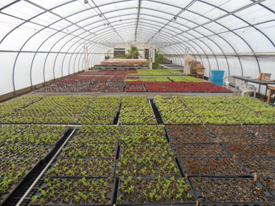
During winter break of her sophomore year at Rutgers, Rebecca Granet noticed a difference between the taste of the lettuce in campus dining halls and the lettuce at her parents' home.
“The lettuce at home is organically grown,” says the junior journalism and media studies major from West Long Branch, New Jersey. “The taste is just so different that I knew I wanted to raise awareness about the benefits of eating produce grown without using sprays or pesticides.”
Granet sat down to write a proposal for what would become The Garden of Eden, an initiative to empower students to make informed decisions about the food they eat through hands-on experiences, education and outreach.
Organic produce, including arugula, chard, radishes, and other vegetables, is planted, cultivated and harvested by students and served at Neilson Dining Hall on Douglass Campus each Wednesday. The produce is served on harvest day to ensure that students receive its optimal nutritional benefits.
"The dedication of the students who work on this initiative is inspiring," Granet says. “They put in a lot of hours, documenting the progress of the produce, rotating on a watering schedule, and literally seeing the produce through - from cultivation to consumption.”


